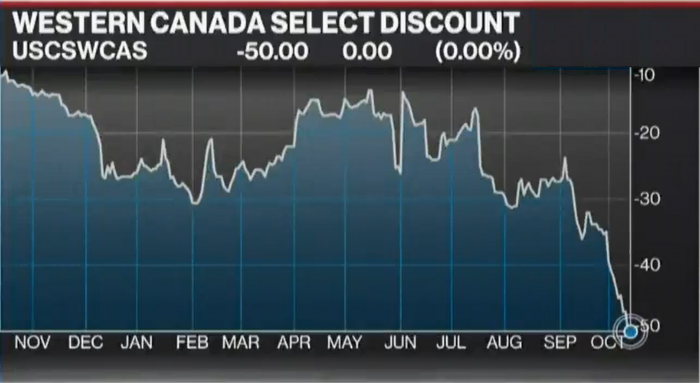Significant rate catalysts often come out of left field. Case in point: collapsing Canadian oil prices.
Check out this chart below. It shows Canadian oil (a.k.a., Western Canada select, or “WCS“) rapidly cheapening versus higher-demand “WTI” oil from the U.S. This is a record discount.

Source: BNN Bloomberg
Its thickness, inferior quality and delivery challenges mean Canadian oil always trades at a discount to WTI (roughly $15 cheaper on average over the long term, says BNN), but this is cray-cray.
Alberta’s oil regulator (AER) projected a $13.50 per barrel average discount from WTI in 2018. We’re at $52 as this is being written.
Why You Should Care
Canada’s largest single export is oil. The industry related to WCS oil contributed $79 billion to Canada’s economy in 2017 (Source: AER). That’s over 5% of GDP.
An oil price meltdown means lost jobs, lost tax revenue, lost government royalties and so on.
This is no joke. Sinking WCS could shave a whopping 0.7 per cent off our national GDP (or more), according to recent estimates by the Fraser Institute.
Lower growth generally means lower inflation risk. Other things equal, this news is bearish for Canadian mortgage rates.
Keep in mind, Canadian oil prices are highly volatile. This spread will likely rebound in the not-too-distant future, say analysts.
Moreover, WCS is just one input affecting interest rates. But it’s a meaningful input when the moves are extreme. For those reasons, this crash in WCS could eliminate one or more Bank of Canada rate hikes. And that’s variable-rate friendly.

 log in
log in
6 Comments
That’s the spot price in Hardisty. Most producers have firm pipeline capacity allocations and therefore get prices much closer to WTI for the majority of their oil.
What producers get for the majority of their oil is inconsequential because it’s the marginal price of oil that determines investment. Those pipelines you refer to are totally oversubscribed and their contracts continually reset, as do the prices producers receive. Canada needs much bigger pipes but our government has completely failed in this respect. On top of it all, we have only one customer for our oil and that customer is dramatically ramping up its own exploration and production.
This is a crisis no matter how you spin it.
Is there a way for the government to completely ignore the protests and what ever ruling the court gives and say we are going to build the pipeline we want because it is required for the economy?
Canada spends way too long and too much money in environmental consultations with the communities. I fee like these people protest because they are not getting enough incentives (free money) for letting the companies build pipelines. They will protest until they receive sufficient incentives for allowing the pipeline. I researched into how these people can even afford to organize and attend such large protests as it costs a lot of money and found out that they get paid to run them through a fund that government has for protecting the environment. This is just utter nonsense. Cut this funding and the protests will automatically reduce. I certainly don’t have time to waste it on going to protests if I wasn’t going to get money to go to it.
Oil-man, I think Rob likes to stick to facts on this site, not emotional drama.
Not all pipeline contracts “continually reset” as you claim; most are multi-year terms. Enbridge’s nomination process for capacity is the exception, not the rule.
And while the US may be our biggest customer, it is false to claim, “we have only one”. China imported a total of 4.30 million barrels of crude oil from Canada in the first seven months of 2017, according to the General Administration of Customs data.
The US ramp in production is super light and can’t be processes at most refineries in the gulf coast. If we stopped shipping to the US it would be detrimental to them as their heavy feedstock from Venezuela has been been compromised. As well the ultra light oil is almost run directly into naptha unit as it is almost too light for disstilates
@Rahul : Legislation has to change. A slow process.
@Ralph : Are you kidding me? It is fact that 99% of our oil goes to the US. Are you really so literal as to quibble over the figurative and ignore the point? I won’t even argue with you on pipeline economics because you seem underinformed.
@Jesse : For the first time since 1973, the US is the world’s largest producer of crude oil and growing fast. Texas is now second only to Russia and the Saudis in pumping it. https://money.cnn.com/2018/09/12/investing/us-oil-production-russia-saudi-arabia/index.html
Yes shale is mostly light oil but it can be blended with heavier crudes. We’d have lots more heavy for the Americans if there were any type of leadership and negotiating skills in Ottawa. What will probably happen is light oil will sell at a big discount because of refining bottlenecks. That could hurt or help us depending on our ability to get WCS to market.